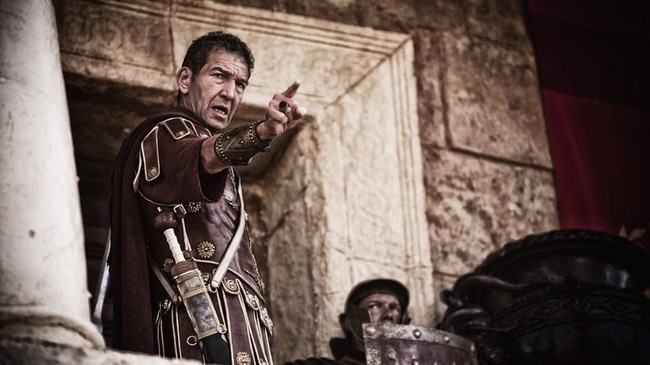This morning’s Gospel reading is John 18:33b–37:
Pilate said to Jesus,
“Are you the King of the Jews?” Jesus answered, “Do you say this on your own or have others told you about me?” Pilate answered, “I am not a Jew, am I? Your own nation and the chief priests handed you over to me. What have you done?” Jesus answered, “My kingdom does not belong to this world. If my kingdom did belong to this world, my attendants would be fighting to keep me from being handed over to the Jews. But as it is, my kingdom is not here.”
So Pilate said to him, “Then you are a king?” Jesus answered, “You say I am a king. For this I was born and for this I came into the world, to testify to the truth. Everyone who belongs to the truth listens to my voice.”
When contemplating this passage, a scene from the classic film The Princess Bride came immediately to mind. Near the end of the brilliant fencing sequence between Westley and Inigo, the latter says in complete wonderment, “Who are you?” Westley replies, “No one of consequence,” to which Inigo responds, “I must know!”
“Get used to disappointment,” Westley quips before finally besting Inigo, but sparing his life.
The question Who are you? drives all first human engagements. Depending on the context, it has as much meaning as time allows. It is at the core of faith, and at the core of denial as well. It is has more meaning than just nominal identity, and in faith, it’s a question we ask ourselves, too.
This question from Pilate is asked of Jesus throughout the Gospels. One could argue that it is the basic question asked in all of scripture, starting with the burning bush all the way to this moment in the Passion of the Christ. As Jesus performed miracles and preached repentance and atonement for sin, everyone asked this same question: Who are you?
Sometimes that question came as a challenge or threat. When Jesus healed on the Sabbath, the Pharisees and scribes asked this question as a question of authority. When Jesus allowed His disciples to glean on the Sabbath, they asked again with the same intent. When Jesus proclaimed that He can forgive sins and that the time for the temple sacrifice was coming to an end, that really provoked the temple authorities, whose power rested on the economy around those sacrifices. Who does Jesus think he is? Only God can forgive sin!
However, the disciples asked the same question, albeit in a different frame of mind. At times, they could not grasp what Jesus’ true mission would be. Would He become a military Messiah that would eject the Romans and give back the Promised Land to the Hebrews? Was He a teacher and philosopher? Arguably, Judas Iscariot refused to accept the true answer and betrayed Jesus to force the issue (although there are other interpretations, of course). The question Who are you? remained part of their lives until Peter’s declaration that Jesus was the Son of God.
By that time, the disciples had plenty of time with Jesus to come to that understanding of who He truly is. When Pilate first encounters Jesus, he has had none of that time, nor does he have much interest in the implications. Pilate wants to know who Jesus is, and more importantly who He says he is, to adjudicate this matter. Jesus’ answer may seem deceptive, but Jesus is working to save Pilate’s soul as well. He wants Pilate to enter into His engagement with the world, in the same way that the centurion did with his servant’s child. He cannot overpower Pilate into faith; Pilate has to find his way there himself and choose it.
That brings us to the even more important question in today’s Gospel, the one left unspoken but undeniably present after Jesus’ mission is complete: Who am I?
Am I a person of faith in the Lord? If so, how do I manifest that — and do I manifest it at all? If someone else introduced themselves to me and asked me, “Who are you?”, would I have an answer that reflected faith in Jesus after giving my name? When we are asked who Jesus is to us, which is the question we can imagine Pilate asking us in His stead, do we say, “Our Lord and King”? And more importantly, do we act like that’s the answer, especially when it matters the most?
To put Pilate’s question to ourselves with any honesty is to force us to come to grips with sin and hypocrisy. It strips away the easy pretenses and requires us to account to the Holy Spirit for all the ways in which we fall short. The clear parallel to this in the Passion is Peter, who denies Christ three times during the night Jesus is arrested when others offer a version of the question Who are you? Rather than stand forth and declare his knowledge of Christ as the Son of God, Peter chooses to lie and deny Jesus entirely.
How often do we do the same when sin and fear become too great for us? How often do we lose our sense of who we are in the Lord, and surrender to who the fallen world around us expects us to be? Too often we deny our redeemed identities and deny Him, and in doing so deny ourselves as well.
When preparing these reflections, I usually pray a bit for forgiveness of my sins and shortcomings and ask God’s grace to help me to offer a reflection of value. The end of my prayer is almost always this: “Lord, help me to remember who I am: a child of God, a disciple of Jesus Christ, and an instrument of Your holy Will.”
Is that who I am? Not as often as I should be, but I know that’s who I am supposed to be. And that’s because I know Jesus Christ is indeed King and the source of my salvation … even if I struggle to act like it. May we hold each other up on the road to the Kingdom in full recognition of who we are all called to be.
Previous reflections on these readings:
The front page image is an image released by 20th Century Fox shows Greg Hicks as Pontius Pilate in a scene from “Son of God.” (AP Photo/20th Century Fox, Casey Crafford)
“Sunday Reflection” is a regular feature, looking at the specific readings used in today’s Mass in Catholic parishes around the world. The reflection represents only my own point of view, intended to help prepare myself for the Lord’s day and perhaps spark a meaningful discussion. Previous Sunday Reflections from the main page can be found here.
Read the full article here




![Justin Trudeau Caught On Camera Dancing At Taylor Swift Concert While Montreal Burns [WATCH] Justin Trudeau Caught On Camera Dancing At Taylor Swift Concert While Montreal Burns [WATCH]](https://www.rvmnews.com/wp-content/uploads/2024/11/2024.11.24-11.39-rvmnews-6743106f91fd6.jpg)





